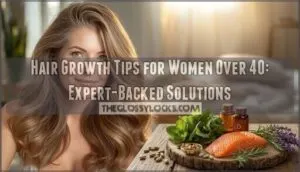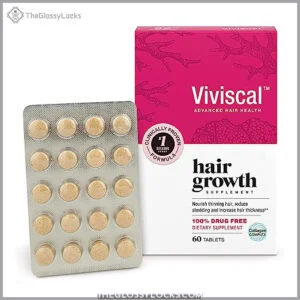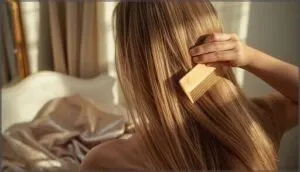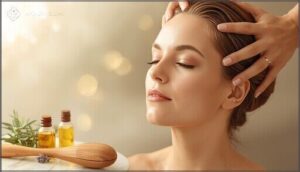This site is supported by our readers. We may earn a commission, at no cost to you, if you purchase through links.

Focus on iron, zinc, and vitamin D through nutrient-dense foods. Manage stress with meditation and proper sleep patterns. Handle your hair gently, minimize heat styling, and try scalp massage to boost circulation.
Clinical studies show supplements like Viviscal can increase terminal hairs by 32% in three months. Topical minoxidil remains a proven treatment for age-related hair loss.
The key is understanding that your changing hormones don’t have to mean accepting thin hair as inevitable – there are specific strategies that work.
Table Of Contents
- Key Takeaways
- Why Hair Thinning Happens After 40
- Essential Nutrients for Hair Growth
- Diet and Lifestyle Tips for Healthy Hair
- Hair Care Practices to Prevent Thinning
- Effective Solutions and Treatments for Hair Loss
- Frequently Asked Questions (FAQs)
- Can you grow thicker hair in your 40s?
- Which foods promote hair growth in older women?
- Can you get amazing hair after 40?
- How can I Make my over-40s hair more fun?
- How can I improve my hair growth as I get older?
- Should you get a short haircut in your 40s?
- How to grow hair faster after 40?
- Can you regrow hair in your 40s?
- How can I stop my hair from thinning at 40?
- How can I thicken my old lady hair?
- Conclusion
Key Takeaways
- Address hormonal changes – Your declining estrogen after 40 disrupts hair growth cycles, but you can fight back with targeted nutrition (iron, zinc, vitamin D), stress management, and proven treatments like minoxidil that extend growth phases.
- Fuel your follicles with the right nutrients – You’ll need protein-rich foods like eggs and fish for keratin building blocks, plus leafy greens for iron and fatty fish for omega-3s that reduce scalp inflammation and support healthy growth.
- Handle your hair gently – Switch to wide-tooth combs, minimize heat styling, sleep on silk pillowcases, and try scalp massage to boost circulation without damaging already vulnerable strands.
- Consider clinical solutions when lifestyle isn’t enough – Supplements like Viviscal show 32% increases in terminal hairs after three months, while topical minoxidil remains proven for age-related thinning when natural approaches need backup.
Why Hair Thinning Happens After 40
After 40, you’ll likely notice your hair isn’t as thick as it used to be, and there’s a solid scientific reason behind this frustrating change.
Your estrogen and progesterone levels start declining during perimenopause, which disrupts your hair’s growth cycle and causes follicles to produce thinner, weaker strands that fall out more easily.
Hormonal Changes and Hair Thinning
After 40, your hormones start playing musical chairs with your hair follicles. Estrogen decline and progesterone impact during menopause create the perfect storm for female hair loss.
As these protective hormones drop off, androgens take center stage. They start shrinking your follicles and cutting short the normal growth cycles your hair needs to thrive.
Thyroid influence adds another layer, as hormonal changes disrupt your hair’s natural rhythm, causing noticeable hair thinning.
Genetic Predisposition to Hair Loss
Your family tree often holds the blueprint for female pattern hair loss. If your mother or grandmother experienced thinning hairlines, you’re likely carrying those inherited hairlines too.
This genetic predisposition doesn’t guarantee hair loss, but it increases your chances a lot. Epigenetic factors can influence when and how severely these genes express themselves, making genetic testing valuable for understanding your personal risk profile.
Stress-Induced Hair Thinning
When you’re stressed out, your hair pays the price. Stress floods your system with cortisol, which throws off the natural rhythm your hair follicles need to grow properly.
Instead of cycling through their normal phases, follicles get confused and start shedding hair too early or just stop producing new strands altogether. It’s like your body decides hair isn’t a priority when it’s busy dealing with whatever’s stressing you out.
When you’re stressed, your body treats hair growth as non-essential and redirects resources elsewhere
The result? Thinner hair and more strands circling the drain.
Key stress factors affecting hair thinning:
- Cortisol spikes – disrupt normal growth phases
- Sleep disruption – impairs cellular repair processes
- Nutrient depletion – stress depletes essential vitamins
- Inflammation – creates hostile scalp environment
Lifestyle changes like meditation, exercise, and adequate sleep help manage stress effectively.
Underlying Medical Conditions Affecting Hair
Stress isn’t the only culprit when it comes to hair thinning after 40. Your thyroid plays a bigger role than most people realize – when it’s out of whack, your hair’s natural growth cycle gets thrown off completely.
Then there are autoimmune conditions like lupus that literally go after your hair follicles. If you’re dealing with anemia, your hair roots aren’t getting enough oxygen to stay healthy.
And for women with PCOS, those elevated androgen levels can trigger the same pattern of hair loss you’d typically see in men.
Anemia effects include reduced oxygen to hair roots, and PCOS impact involves excess androgens causing female pattern hair loss (FPHL). Some medications also trigger telogen effluvium, making scalp infections worse.
Some individuals may experience hair loss due to autoimmune related alopecia.
Essential Nutrients for Hair Growth
After 40, your hair follicles become pickier about what they need to thrive. Think of hormonal shifts as throwing a wrench into your hair’s usual routine – suddenly, those growth cycles that used to run like clockwork start stuttering.
Iron, zinc, vitamin D, and biotin deficiencies creep up more often as we age, and your hair feels it first. Without these key players, follicles struggle to stay in their active growth phase, which means more thinning and slower regrowth when you need it most.
Deficiencies in iron, zinc, vitamin D, and biotin become more common with age, directly impacting your hair’s ability to stay in its active growth phase and leading to increased thinning or slower regrowth.
Iron and Zinc for Hair Health
As menopause shifts your hormonal landscape, iron and zinc become crucial players in keeping your hair healthy. When iron levels drop, your follicles literally can’t get the oxygen they need to produce strong hair—that’s why anemia hits your hairline first.
Meanwhile, zinc works behind the scenes, helping your body build the proteins that make up each strand.
Key dietary sources include:
- Iron-rich foods – lean meats, spinach, lentils
- Zinc powerhouses – oysters, pumpkin seeds, chickpeas
- Absorption boosters – vitamin C with iron, avoiding tea/coffee during meals
Consider hair supplements cautiously, as supplementation risks include overdose.
Importance of Vitamin D for Hair
Your vitamin D levels directly impact hair follicle function through specialized D receptors in scalp cells. Research shows 81.8% of women with hair loss have D deficiency symptoms compared to just 45.5% without thinning.
Poor vitamin D synthesis from limited sun exposure affects hair growth cycles. Insufficient levels of the vitamin can also lead to several hair loss conditions.
Consider D supplementation (600-800 IU daily) or D food sources like fatty fish and fortified dairy to bolster hair health naturally.
Omega-3 Fatty Acids for Hair Health
Healthy hair follicles need omega-3 fatty acids to thrive, especially as inflammation reduction becomes vital for scalp health after 40. These essential fats aid hair growth promotion by nourishing follicles from within.
You’ll find omega-3 benefits in fatty fish, walnuts, and flaxseeds. Most hair supplements include these nutrients alongside other vitamins and nutrients. Dosage recommendations generally suggest 1-3 grams daily for best hair health.
Benefits of Biotin for Hair
When your body lacks biotin, it struggles to build keratin properly, which leaves your hair weak right at the roots.
Think of biotin as the foreman on a construction site – it makes sure all the right materials get where they need to go to build strong hair.
Here’s how biotin aids hair health:
- Strengthens keratin production – Essential for building resilient hair structure from root to tip
- Aids cellular metabolism – Helps follicles efficiently process nutrients for peak hair growth
- Reduces breakage risk – Fortifies existing strands while promoting new growth cycles
- Enhances supplement absorption – Works synergistically with other hair vitamins when biotin dosage is appropriate
Biotin-based supplements generally require 2-5mg daily, though supplement interactions with certain medications warrant medical consultation before starting any hair supplement regimen.
Diet and Lifestyle Tips for Healthy Hair
After 40, hormonal shifts can throw your hair follicles out of their natural growth rhythm, making it harder for them to stay in that crucial anagen phase where active growth happens.
The good news? What you eat, how you handle stress, and staying hydrated can make a real difference in keeping your scalp healthy and fighting back against thinning hair.
Smart dietary choices, stress management techniques, and adequate hydration work together to help your scalp’s health and counteract age-related hair thinning.
Foods That Promote Hair Growth
Focus on nutrient-dense foods to fuel your hair follicles from within. Protein sources like eggs and fish provide keratin building blocks, while leafy greens deliver iron. Healthy fats from salmon foster scalp health, and citrus fruits boost collagen production. A healthy diet rich in vitamins and trace minerals creates the foundation for stronger strands.
| Hair-Boosting Foods | Key Benefits |
|---|---|
| Salmon & Walnuts | Omega-3s for shine and density |
| Spinach & Lentils | Iron prevents thinning |
| Eggs & Sweet Potatoes | Biotin strengthens keratin |
| Berries & Bell Peppers | Vitamin C builds collagen |
Managing Stress for Hair Health
Chronic stress triggers telogen effluvium, forcing healthy follicles into premature rest phases. You can regain control through proven stress reduction techniques that foster hormonal balance and scalp health:
- Practice deep breathing exercises daily to lower cortisol levels
- Schedule regular physical activity to boost mental wellness
- Try yoga or meditation for complete approaches to stress management
- Maintain consistent sleep patterns to avoid stress-induced hair loss
- Consider counseling when overwhelming stressors persist beyond your control
Importance of Hydration and Water Intake
Water acts like your hair’s personal delivery service, carrying nutrients directly to each follicle. Proper hydration benefits include stronger follicle health and improved nutrient absorption.
You’ll need half to one ounce per pound of body weight daily for ideal scalp hydration and water retention. Don’t just drink a lot of water randomly—consistent daily intake bolsters these essential hair health tips and healthy hair habits.
Hair Care Practices to Prevent Thinning
Your daily hair care routine can either protect your thinning hair or accelerate the damage, especially as hormonal changes after 40 weaken your follicles.
Simple adjustments to how you brush, style, and treat your hair will strengthen each strand and create the best possible setting for regrowth.
Gentle Styling and Brushing Tips
Your hair deserves gentle handling, especially when it’s already vulnerable to thinning. Switch to wide-tooth combs for detangling techniques that won’t snap fragile strands. Sleep on silk pillowcases to reduce friction and breakage overnight.
Consider protective hairstyles that minimize manipulation and prevent product buildup. These simple changes protect against hair damage while maintaining your styling routine.
Minimizing Heat and Chemical Treatments
Once you’ve nailed down gentler brushing, your next move is shielding hair from those scorching blow dryers and chemical-heavy treatments that love to thin out your strands.
Think of it as building a fortress around each hair follicle.
Here’s how to minimize hair damage:
- Switch from high-heat blow dryers to cool settings or air-drying methods
- Replace chemical treatments with gentle products containing natural ingredients
- Use protective styling techniques like braids instead of tight ponytails
- Apply heat damage repair serums before any styling
- Choose chemical-free alternatives for coloring and straightening needs
Scalp Massage and Stimulation
Beyond protecting your strands from damage, active scalp stimulation can jumpstart dormant hair follicles back into action. Regular massage techniques improve blood circulation to your scalp, delivering essential nutrients directly to follicle activation sites.
Try gentle circular motions with your fingertips, or explore device options like scalp massagers for consistent pressure. Adding oil application during massage enhances scalp health improvement while promoting natural hair growth through increased scalp stimulation.
Effective Solutions and Treatments for Hair Loss
Sometimes your diet, stress management, and hair care routine just won’t cut it. That’s when you need proven medical treatments to tackle hormonal and age-related hair loss head-on.
Clinical options like topical minoxidil, oral medications, and specialized therapies such as platelet-rich plasma can help get your hair’s thickness and growth cycle back on track.
Clinical options like topical minoxidil, oral medications, and specialized therapies such as platelet-rich plasma can help restore your hair’s thickness and growth cycle.
1. Viviscal Hair Growth Supplements for Women

Clinical studies reveal encouraging news for women battling hair thinning. Viviscal supplements contain AminoMar marine complex, biotin, and vitamin C that nourish follicles from within.
Research shows a 32% increase in terminal hairs and 39% reduction in shedding after three months. You’ll need patience—hair regrowth isn’t overnight magic.
The drug-free formula works best alongside healthy lifestyle choices, making it a gentle yet effective option for age-related thinning.
Best For: Women experiencing hair thinning due to stress, hormonal changes, postpartum recovery, or aging who want a drug-free supplement with clinical backing.
- Clinical studies show 32% increase in terminal hairs and 39% reduction in shedding after 3 months
- Contains proven ingredients like AminoMar marine complex, biotin, and vitamin C that nourish hair follicles from within
- Drug-free formula with excellent safety profile and minimal side effects reported in trials
- Results require patience—visible improvements typically take 3-6 months of consistent use
- May cause adverse reactions like itching or acne in some users, and not suitable for those with seafood allergies
- More expensive than basic hair vitamins, with ongoing monthly costs for sustained benefits
Frequently Asked Questions (FAQs)
Can you grow thicker hair in your 40s?
Yes, you can grow thicker hair in your 40s through targeted nutrition, stress management, and medical treatments. While hormonal changes slow growth, proper care and professional guidance can greatly improve hair density and thickness.
Which foods promote hair growth in older women?
You’ll want to load up on eggs, spinach, fatty fish, and sweet potatoes. Plus, include lean protein, nuts, and seeds.
These foods deliver iron, protein, and essential vitamins that fuel your follicles naturally.
Can you get amazing hair after 40?
Don’t throw in the towel on luscious locks! You can absolutely achieve wonderful hair after 40 with proper nutrition, hormone balancing, targeted treatments like minoxidil, and consistent care addressing age-related follicle changes.
How can I Make my over-40s hair more fun?
You can make your hair more fun by experimenting with face-framing highlights or trying textured cuts like layers or bobs.
Another way to add excitement is by incorporating temporary color treatments, playful accessories, and styling techniques to create volume and movement.
How can I improve my hair growth as I get older?
Aging slows your hair’s growth cycle, but you can fight back. Prioritize protein, iron, and biotin through diet or supplements.
Manage stress with exercise and meditation. Stay hydrated and use gentle products.
Should you get a short haircut in your 40s?
Short hair is like throwing open the curtains to let in natural light—it brightens your face and lifts drooping features.
Short cuts accentuate facial features, making you look younger and providing easier maintenance as hair texture changes with age.
How to grow hair faster after 40?
You’ll need targeted treatments like minoxidil to extend the anagen phase and accelerate growth, plus Low-Level Laser Therapy to stimulate follicles and hormone-balancing nutrition for best results.
Can you regrow hair in your 40s?
Yes, you can regrow hair in your 40s. Treatments like minoxidil, hormone therapy, PRP, and lifestyle changes can stimulate follicles and promote regrowth effectively.
How can I stop my hair from thinning at 40?
Like a medieval apothecary mixing tonics, you’ll need targeted treatments. Manage stress levels, eat protein-rich foods, consider minoxidil treatment, and consult your doctor about hormonal changes affecting follicle health.
How can I thicken my old lady hair?
You can thicken aging hair by using volumizing products, getting regular trims, taking biotin supplements, eating protein-rich foods, and trying gentle scalp massage to stimulate circulation.
Conclusion
Remember, Rome wasn’t built in a day, and neither is healthy hair growth. These evidence-based hair growth tips for women over 40 work when applied consistently.
Your hormones may be shifting, but you’ve got powerful tools to fight back. Combine proper nutrition, gentle hair care, stress management, and proven treatments like minoxidil or supplements.
Stay patient, track your progress, and celebrate small wins. Your hair journey after 40 doesn’t end—it transforms with the right approach and commitment.
- https://www.optimahair.co.uk/blog/effective-hair-loss-treatments-for-women-over-40-a-complete-overview/
- https://www.marieclaire.com/beauty/aging-thinning-hair/
- https://www.health.harvard.edu/blog/thinning-hair-in-women-why-it-happens-and-what-helps-2020032719267
- https://newsnetwork.mayoclinic.org/discussion/mayo-clinic-minute-expert-advice-for-women-with-thinning-hair/
- https://www.uclahealth.org/news/article/what-causes-female-hair-loss








